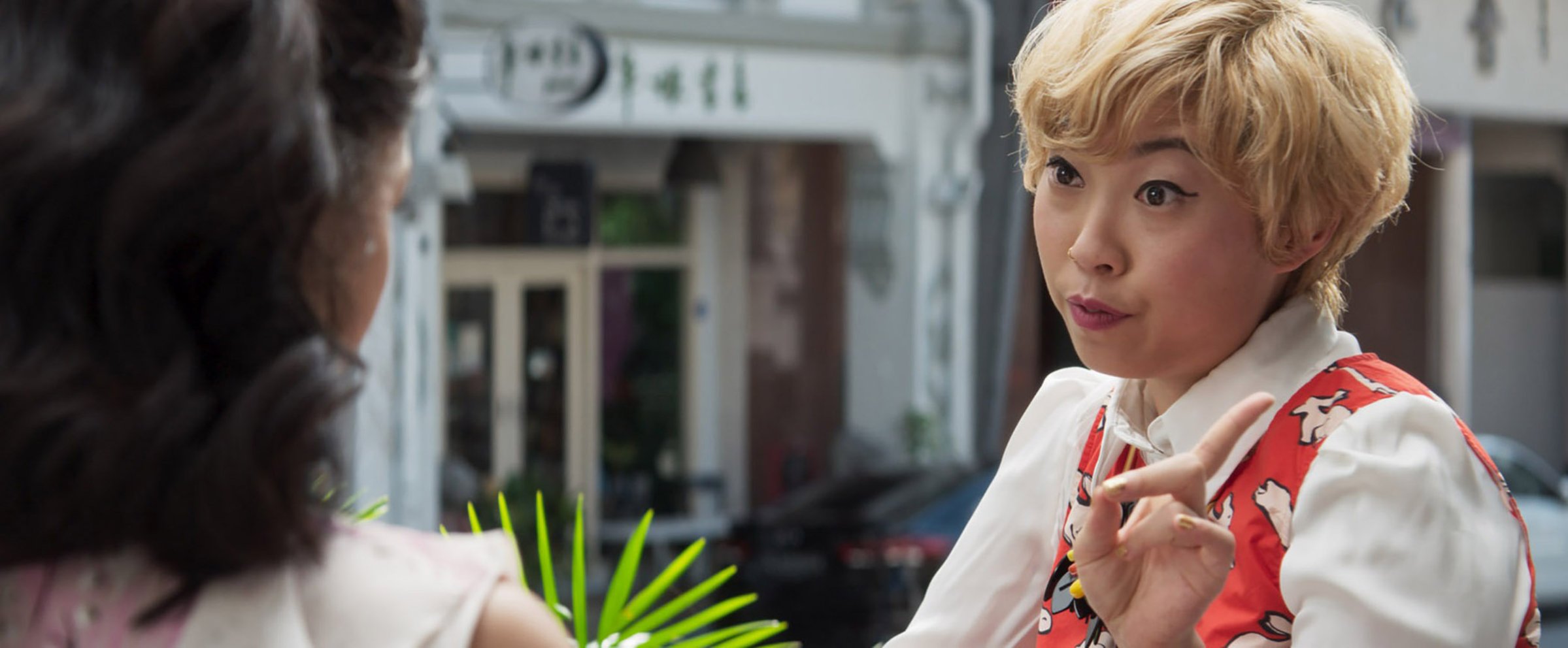
Awkwafina is having a moment. The 29-year-old Queens-bred rapper, comedian and actor, born Nora Lum, gained a dedicated following with boundary-pushing viral videos like “Green Tea,” a 2016 collaboration with Margaret Cho that sends up Asian stereotypes. This summer, she breaks big onscreen in Ocean’s 8 (June 8) and Crazy Rich Asians (Aug. 17).
Here, she talks playing rich, Asian representation in Hollywood and her ultra-famous castmates.
TIME: This is a big year for you.
Awkwafina: The past year has been a whirlwind. I never expected my life to end up where it has, and I still have these dreams where I wake up and it was all fake. It is the best dream ever.
What was it like to be among the over-the-top luxury of Crazy Rich Asians?
Pretending to be a rich person is probably the hardest acting I’ve ever had to do. Crazy Rich Asians teaches audiences that that world doesn’t end in Beverly Hills. It’s even more extravagant out there. When you’re in Singapore, you feel this air of opulence everywhere. I really wish I was as rich as [my character] Peik Lin.
How did working with an all-Asian cast affect the experience?
The cool thing is that it was something that was never spoken of on set. Asian-American people—not just characters—are not one-dimensional. When you have a collection of Asian people on the screen, each one becomes a more complex character that you’ve never seen before. You’re just given that ability when you have more.
Like with every cast, [regardless of] race, you become very close. With this specific movie, we were all in Singapore, most of us for the first time. We were all experiencing this country and the backdrop of this movie for the first time as Asian people. All of those times that you felt less Asian to the times where you felt not American enough — those all came into play when were in Singapore. It was a really cool shared moment.
Could Crazy Rich Asians lead to more diverse casting in romantic comedies?
I hope so. This movie is a risk. But you don’t want the weight of the world on it — diversity shouldn’t be dependent on the success of one movie. We want characters that reflect us, that transport us and that entertain us. You always hope that any movie you’re in does well, but this was an important movie for me as an Asian person — not just as a member of the cast.
Between Crazy Rich Asians and a mostly female cast in Ocean’s 8, these movies are rather atypical.
I came into acting during an enlightenment period in the industry. Stories are being told differently. This is a very exciting time. I probably won’t go through a lot of the bullsh-t a lot of Asian-American actors from years ago went through. I’m very aware of that.
Which Ocean’s 8 castmate were you most excited to meet?
Could there really be a ranking? I will say, it was an extremely warm environment, and that chemistry shows in the movie. We became a family. It was like we were really pulling a heist.
You’ve said that seeing yourself as a role model to other Asian Americans was a process but that you accept it now. What kind of pressure does that bring with it?
In the beginning, I didn’t want to be the representative. But at the same time, it’s something that’s out of my hands. I’m going to be representing Asian people until my last dying breath of saying I didn’t want to represent Asian people. It’s just something that happens by default. That does become some kind of burden. The way I negotiate that within my acting career is [through] certain things I’ll do to protect the longevity of my community in the business — that is, being authentic and not giving in to old, dumb tropes that have essentially ruined us. I will try to do that as much as I can. But I also want to be known outside of the Asian-American bubble. I want to be known for being Awkwafina, not the Asian-American girl.
How was working with Margaret Cho for “Green Tea?”
That was so amazing. Awkwafina wouldn’t exist in a world without Margaret Cho. When I saw her as a young kid, it was astonishing. I had never seen that. Just the image of her, the powerfulness of the Asian woman, and especially the Asian American, one that had no accent and was shameless and unabashed in every way. She moved me to such extreme heights. Years later, just to work with her was legendary and an experience that will forever impact me.
More Must-Reads from TIME
- Donald Trump Is TIME's 2024 Person of the Year
- Why We Chose Trump as Person of the Year
- Is Intermittent Fasting Good or Bad for You?
- The 100 Must-Read Books of 2024
- The 20 Best Christmas TV Episodes
- Column: If Optimism Feels Ridiculous Now, Try Hope
- The Future of Climate Action Is Trade Policy
- Merle Bombardieri Is Helping People Make the Baby Decision
Write to Mahita Gajanan at mahita.gajanan@time.com